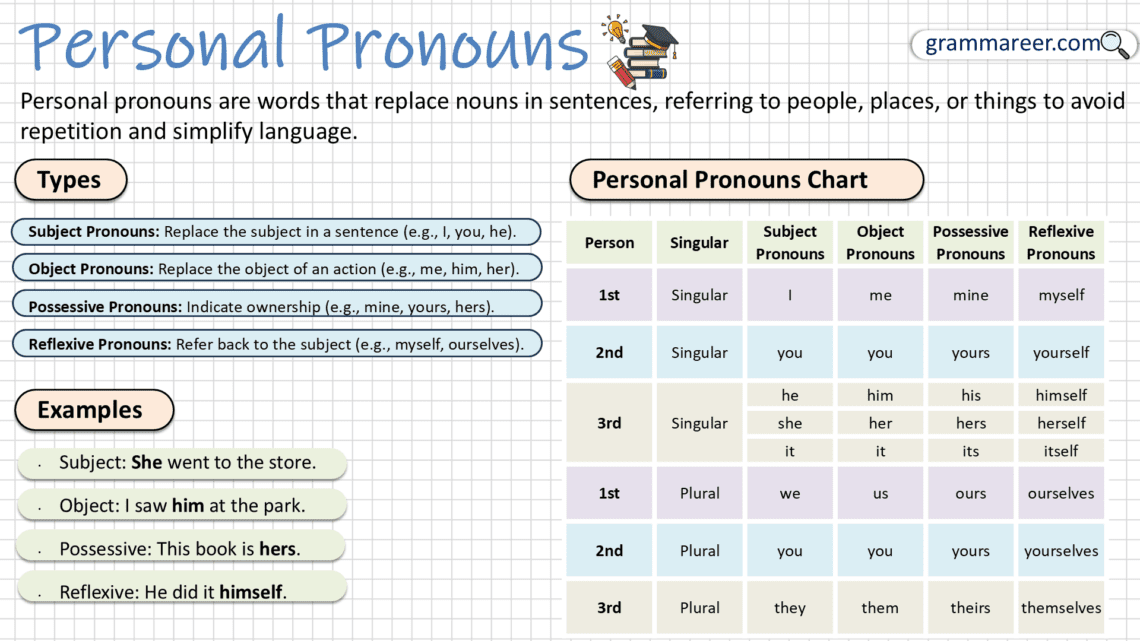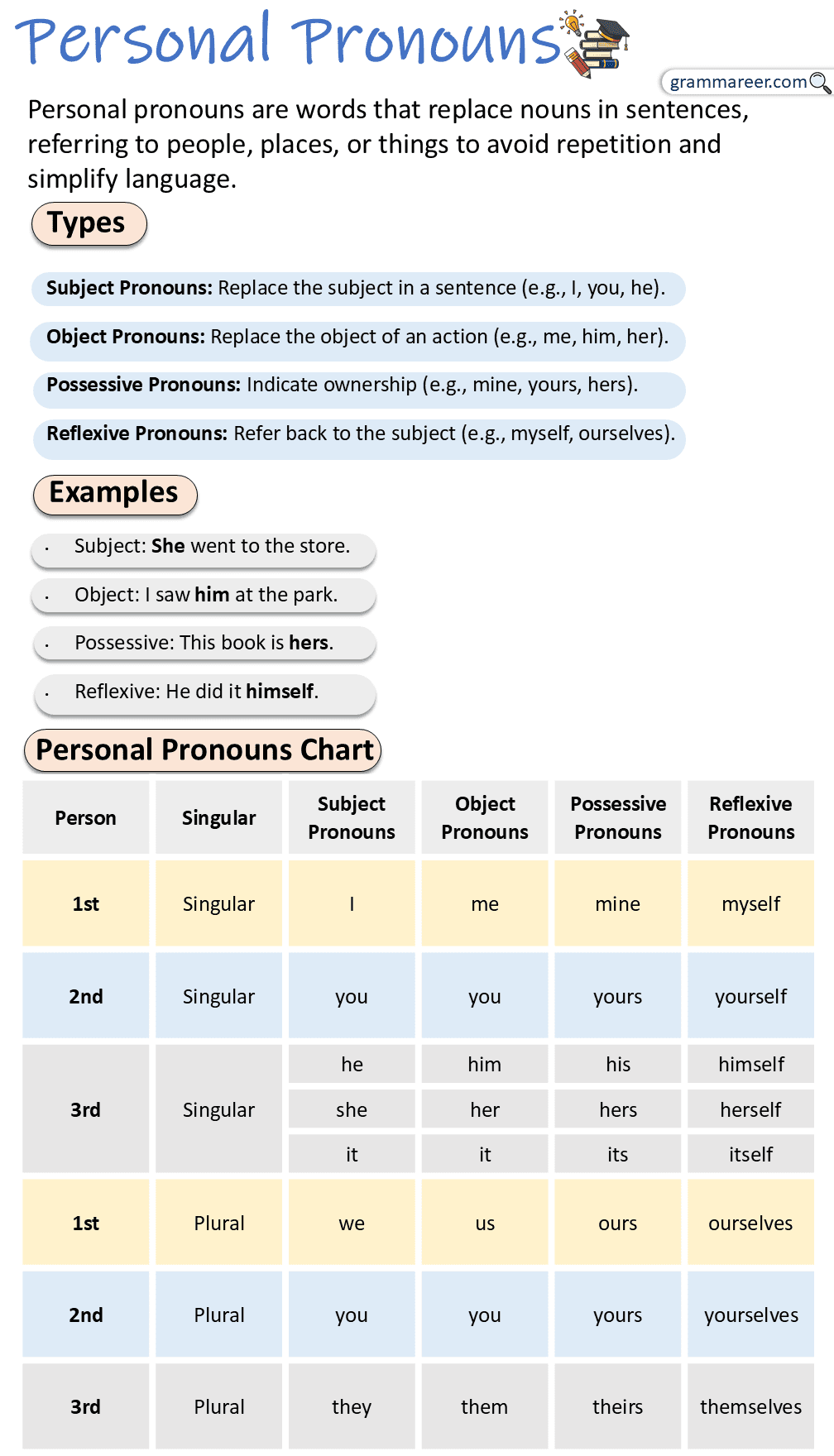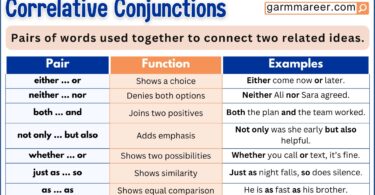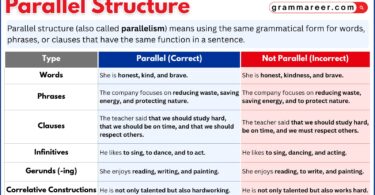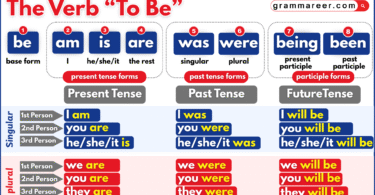Personal pronouns are an essential part of English grammar, and they play a significant role in replacing nouns to avoid repetition. They allow us to refer to people, places, or things without constantly repeating names or objects. By understanding how to use these pronouns effectively, we can make our communication clearer and more efficient.
Table of Contents
What Are Personal Pronouns?
Personal pronouns are words used to replace specific nouns that have already been mentioned or are understood from context. These pronouns refer to people or things and take different forms depending on their grammatical role in the sentence, such as the subject, object, or possessive case. Some common pronouns are:
I, you, he, she, it, we, and they.
Types of Personal Pronouns
There are several categories of personal pronouns, each serving a specific function in a sentence. Let’s take a closer look at these categories.
Subject Pronouns
Subject pronouns replace the subject (the noun performing the action) in a sentence. Examples of subject pronouns: I, you, he, she, it, we, they.
- I went to the store.
- She is a great singer.
- They are playing football.
Object Pronouns
Object pronouns replace the object (the noun receiving the action) in a sentence. Examples of object pronouns: me, you, him, her, it, us, them.
- He called me yesterday.
- We invited them to the party.
- She gave the book to him.
Possessive Pronouns
Possessive pronouns show ownership or possession and replace nouns to avoid repetition. Examples of possessive pronouns: mine, yours, his, hers, its, ours, theirs.
- That car is mine.
- The house is theirs.
- This is her phone.
Reflexive Pronouns
Reflexive pronouns are used when the subject and object of a sentence are the same, meaning that the action is performed on the subject itself. Examples of reflexive pronouns: myself, yourself, himself, herself, itself, ourselves, yourselves, themselves.
- I did it myself.
- He hurt himself while running.
- They cooked for themselves.
| Person | Singular | Subject Pronouns | Object Pronouns | Possessive Pronouns | Reflexive Pronouns |
|---|---|---|---|---|---|
| 1st Person | Singular | I | me | mine | myself |
| 2nd Person | Singular | you | you | yours | yourself |
| 3rd Person | Singular | he | him | his | himself |
| she | her | hers | herself | ||
| it | it | its | itself | ||
| 1st Person | Plural | we | us | ours | ourselves |
| 2nd Person | Plural | you | you | yours | yourselves |
| 3rd Person | Plural | they | them | theirs | themselves |
This table provides a clear overview of personal pronouns, distinguishing between singular and plural forms in various grammatical cases.
When to Use Personal Pronouns
Using them is important for clarity and conciseness in writing and speaking. They help avoid repetitive use of nouns and make sentences flow more smoothly.
Replace the Subject or Object
Use personal pronouns to replace a noun that acts as the subject or object.
Instead of saying “Sarah went to Sarah’s car,” you can say “She went to her car.”
Referring to People, Animals, or Things
These pronouns are commonly used to refer to people or things already mentioned in a conversation or text.
- He gave me a gift.
- They are going on a trip.
Emphasizing Possession
Emphasizing Possession refers to the use of possessive pronouns to show ownership without repeating the object being discussed. Possessive pronouns allow for clear, concise communication by eliminating the need to restate the noun.
- This phone is mine, not yours.
- That book is hers.
- The car is ours.
These pronouns (mine, yours, his, hers, ours, theirs) make it clear who owns or possesses something, helping sentences flow more smoothly without unnecessary repetition.
Common Errors with Personal Pronouns
Even though these pronouns are straightforward, a few common mistakes can occur:
- Incorrect Pronoun Use in Subject or Object Position:
❌ Me went to the store.
✅ I went to the store. - Mixing Possessive and Object Pronouns:
❌ That is him car.
✅ That is his car. - Incorrect Reflexive Pronoun Usage:
❌ He did it by himselfs.
✅ He did it by himself.
Examples of Personal Pronouns in Sentences
Let’s review some practical examples of these pronouns in various sentences:
| Type of Pronoun | Example Sentence |
|---|---|
| Subject Pronoun | She went to the store. |
| Object Pronoun | I gave the gift to him. |
| Possessive Pronoun | This is my favorite book. |
| Reflexive Pronoun | He completed the project by himself. |
| Replacing a Noun | They are coming to the party. |
| Showing Possession | That bag is yours. |
Why Personal Pronouns Matter
Mastering personal pronouns is crucial in English because they allow us to communicate clearly and efficiently. Whether we are replacing nouns or showing possession, these pronouns help avoid redundancy and make sentences easier to understand.
Read More

